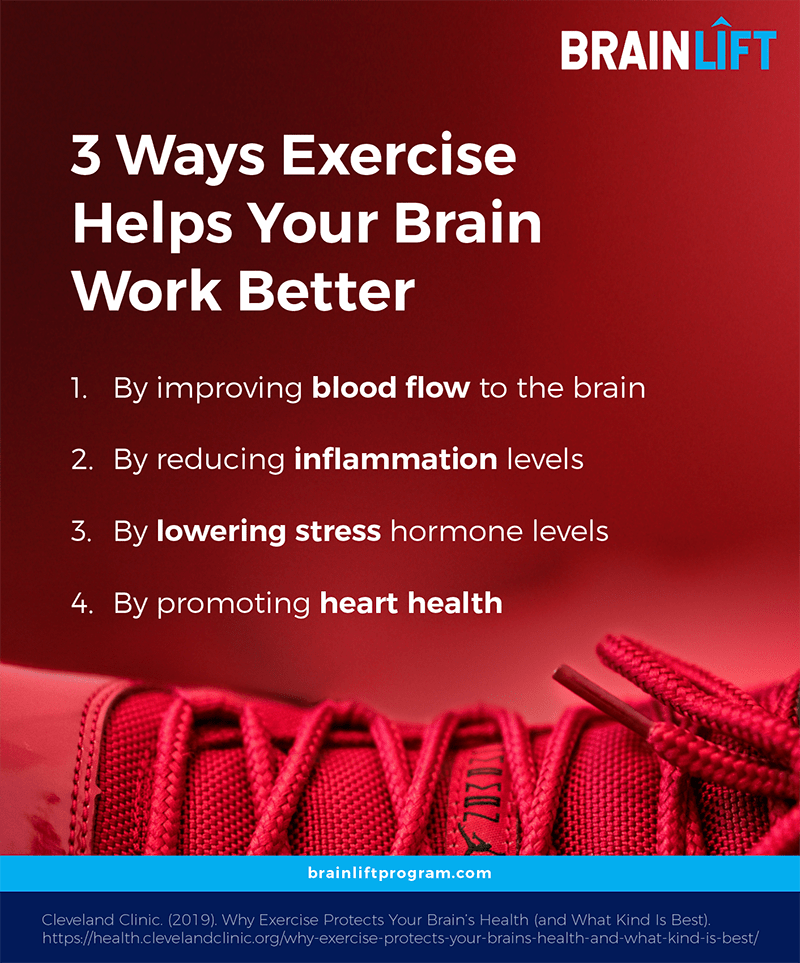SUMMARY:
-
Exercise plays a considerable role in combating Alzheimer’s disease.
-
Exercise can regulate genes that affect cognitive decline–meaning you can exert some control over your brain health instead of just leaving it all to genetics.
-
Brain health and heart health are interconnected.
Did you know that physical exercise can literally rewire your brain, creating new connective pathways between nerve cells? This rewiring is called neuroplasticity and exercise-induced neuroplasticity has been shown to lower your risk of neurodegenerative decline and diseases like Alzheimer’s. In fact, research has shown that when we throw exercise in the mix, it makes us 43% more likely to experience successful aging across the board.
Exercise, Alzheimer’s, and Genetics
Even if a condition like Alzheimer’s disease has made a prevalent appearance throughout your family’s medical history, you have the ability to break the chain. The days of believing that your genes determine your destiny are over.
Your environment and lifestyle choices have the ability to turn on and off specific gene expression–meaning you have more control than scientists previously thought!
Exercise Helps Your Brain Work Better
According to neuropsychologist Aaron Bonner-Jackson, Ph.D. some of the ways that exercise boosts cognition are:
- By improving blood flow to the brain
- By reducing inflammation levels
- By lowering stress hormone levels
- By promoting heart health

A 2018 review by scientists at the University of Southern California found that as many as 1 in 3 cases of Alzheimer’s disease may be preventable through lifestyle change, with exercise being a prominent contributing factor. Another meta-analysis determined that exercise increased overall cognitive ability and identified a slowing in the rate of cognitive decline in those with Alzheimer’s disease.
Exercise Makes Your Brain Grow
A randomized controlled trial with 120 older adults was able to determine that aerobic-specific exercise can increase the size of the anterior hippocampus in your brain, and in turn, generates improvement in spatial memory. This trial revealed a 2% increase in hippocampal volume, which effectively reversed age-related loss in volume by 1 to 2 years. Gym #gains aren’t just for the muscles you see⸺exercise can be a fountain of youth for your brain as well!
Heart Health Is Tied To Brain Health
Interestingly, researchers have also found that cardiovascular and cognitive health go hand in hand and that measures taken to protect your heart have also been shown to reduce your risk of developing Alzheimer’s disease. What a great motivator – knowing that you can affect change when it comes to both cardiovascular disease and neurodegenerative diseases like Alzheimer’s! How’s that for multi-tasking?
Getting Started
When it comes to exercise, everyone’s starting point will look different. Here are a few simple and easy changes you can make to be more active (because sitting is the new smoking):
- Get a standing desk
- Do calf raises while standing at your desk, or while doing the dishes
- Park at the back of the parking lot
- Walk around when you’re on the phone
- Have walking meetings
- Walk around your office building during your lunch break
- When working on the computer or watching movies at home, set an alarm to get up every 15-20 minutes
- Work in the yard
- Skip moving walkways, elevators, and escalators and take the stairs whenever possible
- Avoid drive-thrus
- Clean your house
- Drink water from a small bottle, so you have to refill it more often
- Carry groceries (when you don’t have a lot) in a basket instead of using a cart
- Squeeze a grip strengthener when you’re on the phone
- Arrange your office so you have to walk to get to everything (printer, supplies, etc.)
- Plan family activities that encourage movement (walks, wrestling, tag, follow-the-leader, sports, dance, etc.)
Exercises to Strengthen Your Brain
When you’re ready and able to implement a regular exercise routine, Dr. Gad Marshall, Associate Medical Director of Clinical Trials at the Center for Alzheimer Research and Treatment, recommends 30 minutes of moderately vigorous aerobic exercise at least three to four days each week. He supports the overwhelming evidence that points to the use of physical exercise as an aid in the prevention of Alzheimer’s, as well as in slowing the progression of the disease.
Through systematic review, it’s been found that both aerobic-exclusive exercise, as well as a blend of aerobic and non-aerobic exercise, had beneficial effects on cognitive health.
Examples of aerobic exercise include brisk walking, dancing, swimming, stationary bike-riding, tennis, and golfing (without the cart!). Aerobic exercise can even include things like raking leaves and mowing the lawn. Switch up your routines often to keep things interesting!
Need a little push? Researchers from Kansas State University found that people who exercised with a “more fit” partner were able to increase their workout stamina and endurance by a whopping 200 percent.
Decide today to find more ways to be active. Whether you start small and pick a few of the suggestions above or whether you’re ready to commit to a scheduled exercise goal, every little bit counts! Simply being more mindful of how much you are sitting is a great start.
Get ready, get set, get moving!
REFERENCES:
-
https://www.sciencedirect.com/science/article/abs/pii/S0306452206003228
-
https://www.britannica.com/science/neuroplasticity
-
https://www.hindawi.com/journals/jar/2012/190654/
-
https://health.clevelandclinic.org/why-exercise-protects-your-brains-health-and-what-kind-is-best/
-
https://www.thelancet.com/journals/lancet/article/PIIS0140-6736(17)31363-6/fulltext
-
https://pubmed.ncbi.nlm.nih.gov/26607411/
-
https://pubmed.ncbi.nlm.nih.gov/23962667/
-
https://pubmed.ncbi.nlm.nih.gov/21282661/
-
http://www.alzrisk.org/riskfactorview.aspx?rfid=5
-
https://www.health.harvard.edu/alzheimers-and-dementia/what-can-you-do-to-avoid-alzheimers-disease
-
https://www.newswise.com/articles/burning-more-calories-is-easier-when-working-out-with-someone-you-perceive-as-better


